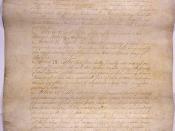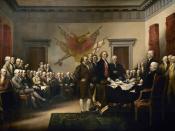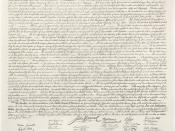Roger Sherman was born in Newton, Massachusetts on April 19, 1721, to William and Mehetabel Sherman. Roger lived in Newton until 1743. He was taught the trade of a cobbler. He received no formal education. He was taught be Rev. Samuel Dunbar. Rev. Dunbar taught Rogers math, history, theology , law and politics. Rogers was very interested in law and politics. Sherman was a very smart man. He was often seen by those that he worked with reading while working. Sherman was also interested in the church. Because of this it was very strange that he didn't join the church until early manhood. His reason for not joining the church was that he generally took a long time to make important decisions. Roger's father died in 1741 and two years later Roger moved to New Milford, Connecticut. Roger's older brother, William lived in New Milford. Some people say that Rogers walked the entire distance with his tools on his back.
In 1745 he became the surveyor of New Haven County. He held this post until 1758. This position was very powerful and Sherman acquired many plots of land. It was a this time that Roger took an active part in what happened of the town. He became a juryman, clerk of the church, deacon and a committee member of the school. In 1756 Roger became the owner of the first town store in New Milford. His brother and him had been running it. Roger also published a book which spoke about why other states money couldn't be used in Connecticut. Roger also suggested that a tax be placed on rum to discourage its use.
In 1754 Roger Sherman passed the bar exam and became a lawyer. In 1755 he was appointed to Connecticut's general assembly. The assembly made Sherman...


